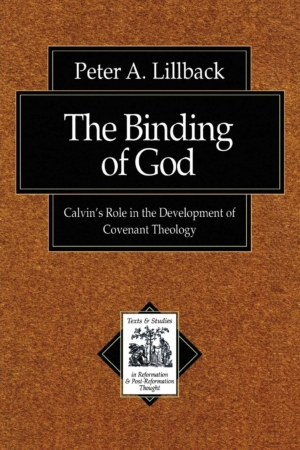It is a small thing—so small that it might go unnoticed—but as in Exercitation VI, in Exercitation XIX where Owen considered the “State and Ordinances of the Church Before the Giving of the Law,” he consistently spoke of the “Jewish church.”1 To . . . Continue reading →
Covenant Theology
John Owen Did Not Read Hebrews Like A Baptist (Part 2)
In his exercitation on “the oneness of the church” Owen argued seven points. Each and all of them were in the service of what Reformed theology calls the unity of the covenant of grace. For Owen and the mainstream of Reformed orthodoxy, . . . Continue reading →
John Owen Did Not Read Hebrews Like A Baptist (Part 1)
It is the habit of some of our Particular Baptist friends to imply, suggest, or even to say plainly that the great English Reformed theologian John Owen (1616–1683) was practically Baptist in his covenant theology.1 He is arguably one of the greatest theologians . . . Continue reading →
Review: The Binding of God: Calvin’s Role in the Development of Covenant Theology by Peter A. Lillback
Whether Calvin was a covenant theologian has been a matter of considerable confusion and controversy in modern Calvin studies. The answer to this question has usually been determined by whether one considers the rise of covenant theology a positive or negative development, . . . Continue reading →
Abraham, Moses, and Baptism
I am in the midst of an interesting discussion of baptism with a friend. This friend has Baptist convictions, yet he understands Reformed theology better than many of the Reformed. He is quite sympathetic to historic and confessional Reformed theology. For example, . . . Continue reading →
With The Guilt, Grace, Gratitude Podcast On The Covenant Of Redemption
Late last month I had the pleasure of talking with Nick from the Guilt, Grace, Gratitude podcast about the covenant of redemption. This is an important, if neglected, aspect of Reformed theology. From all eternity the Father, Son, and Spirit loved a . . . Continue reading →
Heidelcast Special: Chad Vegas On Covenant and Baptism (6)
This is a special episode of the Heidelcast and a special series featuring my dear friend and colleague in ministry, Chad Vegas, pastor of Sovereign Grace Bakersfield. He’s been walking his congregation from a Baptist to a Reformed understanding of covenant theology . . . Continue reading →
Why You Should Be Listening To This Series (And Stay Tuned For Part 6 Tomorrow)
I want to contend that we can have earnest and vigorous disagreement and yet have earnest and vigorous disagreement in a manner that honors Christ and that is eager to maintain the unity that we have in the Spirit. I know that . . . Continue reading →
Heidelcast Special: Chad Vegas On Covenant and Baptism (5)
This is a special episode of the Heidelcast and a special series featuring my dear friend and colleague in ministry, Chad Vegas, pastor of Sovereign Grace Bakersfield. He’s been walking his congregation from a Baptist to a Reformed understanding of covenant theology . . . Continue reading →
Heidelcast Special: Chad Vegas On Covenant and Baptism (4)
This is a special episode of the Heidelcast and a special series featuring my dear friend and colleague in ministry, Chad Vegas, pastor of Sovereign Grace Bakersfield. He’s been walking his congregation from a Baptist to a Reformed understanding of covenant theology . . . Continue reading →
Heidelcast Special: Chad Vegas On Covenant and Baptism (3)
This is a special episode of the Heidelcast and a special series featuring my dear friend and colleague in ministry, Chad Vegas, pastor of Sovereign Grace Bakersfield. He’s been walking his congregation from a Baptist to a Reformed understanding of covenant theology . . . Continue reading →
Heidelcast Special: Chad Vegas On Covenant And Baptism (2)
This is a special episode of the Heidelcast and a special series featuring my dear friend and colleague in ministry, Chad Vegas, pastor of Sovereign Grace Bakersfield. He’s been walking his congregation from a Baptist to a Reformed understanding of covenant theology . . . Continue reading →
Heidelcast Special: Chad Vegas On Covenant And Baptism (1)
This is a special episode of the Heidelcast and special series featuring my dear friend and colleague in ministry, Chad Vegas, pastor of Sovereign Grace Bakersfield. He’s been walking his congregation from a Baptist to a Reformed understanding of covenant theology and . . . Continue reading →
Hebrews 11, The Faith, And The Substance Of The One Covenant Of Grace (Part 2)
What then about Hebrews 11:1? Substance (ὑπόστασις) is attributed to faith (πίστις)—by the way, “faithfulness” does not work here at all as a translation of faith. Steve Baugh is exactly correct when he writes, “My understanding of Hebrews 11 proceeds from the . . . Continue reading →
Hebrews 11, The Faith, And The Substance Of The One Covenant Of Grace (Part 1)
For a lot of modern evangelicals, the Bible is a disconnected series of character studies followed by the Gospels, Acts, the Epistles, and the Revelation. Continue reading →
A Response to Brent E. Parker and Richard J. Lucas (eds.), Covenantal and Dispensational Theologies: Four Views on the Continuity of Scripture (Part 3)
This is the final installment of a three-part review of Brent Parker and Richard Lucas’ new volume of essays wherein theologians representing traditional Reformed covenant theology, progressive covenantalism, progressive dispensationalism, and traditional dispensationalism interact on issues of continuity and discontinuity in redemptive . . . Continue reading →
A Response to Brent E. Parker and Richard J. Lucas (eds.), Covenantal and Dispensational Theologies: Four Views on the Continuity of Scripture (Part 2)
This three-part series reviews the new multi-view collection of essays, edited by Richard Lucas and Brent Parker, concerning the unity of redemptive history as expressed in various forms of covenantal and dispensational theologies. Part one considered Michael Horton’s argument for traditional Reformed . . . Continue reading →
Getting The Gospel Right: The Heidelcast, The Pactum Podcast, NoCo Radio, And Theocast
This is a special episode of the Heidelcast recorded together with my friends Mike Abendroth, from No Compromise Radio, Pat Abendroth and Mike Grimes from the Pactum Podcast, and Jon Moffit and Justin Perdue of Theocast podcast. We gathered last Friday evening . . . Continue reading →
A Response to Brent E. Parker and Richard J. Lucas (eds.), Covenantal and Dispensational Theologies: Four Views on the Continuity of Scripture (Part 1)
At my ordination, I took a vow that I hold the Westminster Standards “as containing the system of doctrine taught in the Holy Scriptures,” expressing that these documents summarize the shape of biblical truth most accurately. This “system” of doctrine connects various . . . Continue reading →
What Is And Is Not New About The New Covenant
Because the Baptist tradition(s) operate from a set of assumptions that are, in certain important ways, distinct from those with which the Reformation churches operate regarding the history of redemption it can be a challenge for those of us within the Reformed . . . Continue reading →








